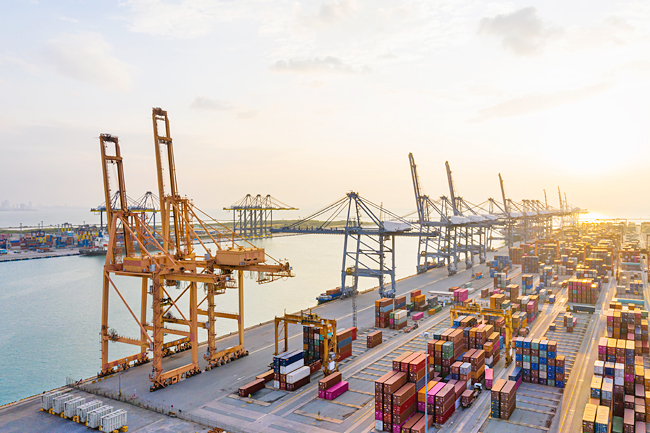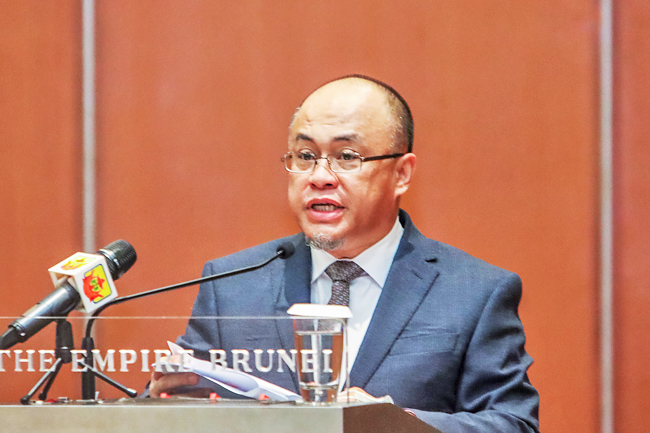Rokiah Mahmud
Indonesia’s plan to relocate and build its new capital city in Nusantara, East Kalimantan, many expect the rapid spur of a wide range of development and economic activities across the three nations on Borneo Island – Brunei Darussalam, Malaysia and Indonesia.
It certainly will have a domino effect and help to develop other areas in Southeast Asia and balance the economic development throughout Borneo.
This was underlined by Minister of Primary Resources and Tourism Dato Seri Setia Dr Haji Abdul Manaf bin Haji Metussin in his keynote address during the recent Business Roundtable on Borneo.
With his keynote titled ‘Greater Collaboration and Economic Integration to Foster Regional Economic Growth’, the minister touched on the trade activities and investment potential among countries in the Brunei Darussalam, Indonesia, Malaysia and the Philippines East ASEAN Growth Area (BIMP-EAGA) region.
According to the minister, the total trade in goods within the BIMP-EAGA region recorded in 2021 totalled up to USD15.6 billion, of which this figure breaks into USD5 billion accounted by import while USD10.6 billion recorded for export. These trade figures, he added, are astounding and present opportunities for the inflow of domestic and foreign direct investment (FDI).


Meanwhile, in terms of investment size, the FDI reached up to USD136 billion in 2021 whereas domestic investment contributed to a total of USD7.3 billion. These figures showed an increase with annual growth rate of 6.1 per cent for the FDI.
The minister noted that there are major factors within the business ecosystem that need to be addressed and strengthened towards realising the projected economic growth and as well as to be on track with accelerating development particularly in Borneo.
One critical factor, according to the minister, is on connectivity within the region, in which initiatives to enhance connectivity between countries or states within and outside the BIMP-EAGA region need to be rigorously planned and implemented.
For the Sultanate, strategic initiatives in the area of connectivity have been planned and implemented by agencies and private sectors, such as the Brunei Economic Development Board (BEDB), Muara Port Company Sdn Bhd (MPC) and Ministry of Finance and Economy (MoFE).
The minister also noted that efforts have been undertaken in realising the establishment of the BIMP-EAGA Transshipment Hub in Brunei Darussalam. The effort is in line to improve connectivity as well as supporting Brunei Darussalam’s Service Industry Roadmap (Maritime).
Through this, he added, Muara Port is envisioned to be a stable shipping and transshipment hub within the region.
“By improving the connectivity, this will support and service businesses or trade volumes within and outside Borneo that will be gradually increasing in number.”
The minister shared it is also vital to improve land and air connectivity. “We also need to strengthen people-to-people connectivity by promoting and increasing mobility within Borneo and connecting the island with the rest of the world. With improved connectivity, there will be positive impact to the business landscape brought about the seamless flow of not only goods and services but also movement of people across Borneo and the world.
“At the same time, businesses in this region need to embed the use of technology in their planning and operation as it plays a paramount role to further enhance connectivity.”
In addition, the minister highlighted the role of technology that can further enhance connectivity in e-business through improved communication in real-time and resolving issues quickly and building stronger relationships, better access to global markets, opening up new markets and opportunities and grow customer base, increase business efficiency, reducing costs and increasing productivity, enhance customer experience and make it easier to collect and analyse customer data, which enables businesses to make informed decisions based on customer preferences and behaviours.
Fostering a business-friendly environment in Borneo, he added, will encourage innovation, entrepreneurship and investment. Government, businesses and relevant organisations must work in synergy to create policies and frameworks that promote ease of doing business, remove barriers to trade and investment and facilitate cross-border cooperation.
Governments, businesses and relevant agencies must work together on simplifying procedures, reducing regulations that impede business growth, and providing incentives for companies to invest.
Trade barriers can be further minimised or removed by negotiating trade agreements and promoting international cooperation and ensure the businesses have access to global markets. Facilitating cross-borders can be achieved through collaboration between businesses amongst countries on Borneo, sharing best practices and encourage the exchange of ideas and technologies.
Emphasis on sustainable development and green initiatives is also an important aspect that most businesses and investments are now looking into. With Borneo being one of the most biodiverse regions in the world and has vast natural resources, it is crucial for the region to develop without damaging the environment and preserving these resources.
Thus, the prospect of responsible investment for sustainable development in Borneo is very promising and has the potential to contribute significantly to economic, social and environmental development of the region.
“With our commitment to promote sustainable development and protecting the environment, this will set an example not only to this region but also around the world that sustainability and development can go hand-in-hand,” said the minister.
“As we move forward to unlock this economic potential further and harness maximum economic benefits, it is imperative for us to continue engaging in dialogue and collaboration, build networks and partnerships and create sharing and learning platforms.”
The Minister also highlighted the importance and power of collaboration, noting that Brunei Darussalam, Malaysia (Sabah and Sarawak) and Indonesia (Kalimantan) are important strategic partners.
These countries, he said, have high economic complementarity and enormous potential for cooperation.
“There are vast opportunities for collaboration and economic integration in Borneo and we must leverage our respective strengths and resources to create a more integrated and connected region as well competitive and resilient regional economy.”
The Business Roundtable on Borneo is an element of the Brunei Economy Programme hosted by ASEAN and APEC Business Advisory Councils of Brunei Darussalam in collaboration with the MoFE, and in partnership with leading public and private sector organisations to link APEC and ASEAN priorities with the business community.





